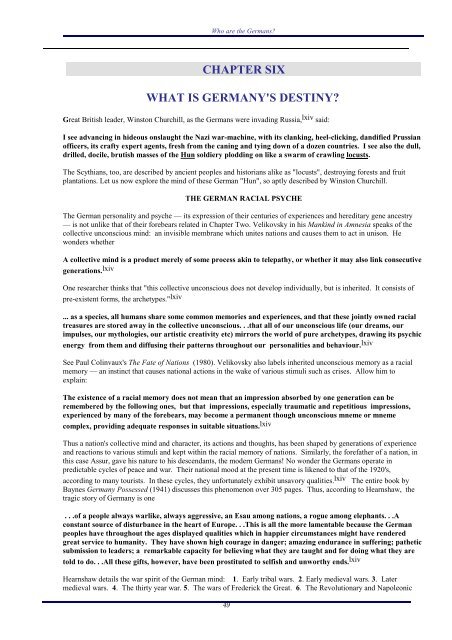WHO ARE THE GERMANS - Churches of God Cyber Auxiliary
WHO ARE THE GERMANS - Churches of God Cyber Auxiliary
WHO ARE THE GERMANS - Churches of God Cyber Auxiliary
You also want an ePaper? Increase the reach of your titles
YUMPU automatically turns print PDFs into web optimized ePapers that Google loves.
Who are the Germans?<br />
CHAPTER SIX<br />
WHAT IS GERMANY'S DESTINY?<br />
Great British leader, Winston Churchill, as the Germans were invading Russia, lxiv said:<br />
I see advancing in hideous onslaught the Nazi war-machine, with its clanking, heel-clicking, dandified Prussian<br />
<strong>of</strong>ficers, its crafty expert agents, fresh from the caning and tying down <strong>of</strong> a dozen countries. I see also the dull,<br />
drilled, docile, brutish masses <strong>of</strong> the Hun soldiery plodding on like a swarm <strong>of</strong> crawling locusts.<br />
The Scythians, too, are described by ancient peoples and historians alike as "locusts", destroying forests and fruit<br />
plantations. Let us now explore the mind <strong>of</strong> these German "Hun", so aptly described by Winston Churchill.<br />
<strong>THE</strong> GERMAN RACIAL PSYCHE<br />
The German personality and psyche — its expression <strong>of</strong> their centuries <strong>of</strong> experiences and hereditary gene ancestry<br />
— is not unlike that <strong>of</strong> their forebears related in Chapter Two. Velikovsky in his Mankind in Amnesia speaks <strong>of</strong> the<br />
collective unconscious mind: an invisible membrane which unites nations and causes them to act in unison. He<br />
wonders whether<br />
A collective mind is a product merely <strong>of</strong> some process akin to telepathy, or whether it may also link consecutive<br />
generations. lxiv<br />
One researcher thinks that "this collective unconscious does not develop individually, but is inherited. It consists <strong>of</strong><br />
pre-existent forms, the archetypes." lxiv<br />
... as a species, all humans share some common memories and experiences, and that these jointly owned racial<br />
treasures are stored away in the collective unconscious. . .that all <strong>of</strong> our unconscious life (our dreams, our<br />
impulses, our mythologies, our artistic creativity etc) mirrors the world <strong>of</strong> pure archetypes, drawing its psychic<br />
energy from them and diffusing their patterns throughout our personalities and behaviour. lxiv<br />
See Paul Colinvaux's The Fate <strong>of</strong> Nations (1980). Velikovsky also labels inherited unconscious memory as a racial<br />
memory — an instinct that causes national actions in the wake <strong>of</strong> various stimuli such as crises. Allow him to<br />
explain:<br />
The existence <strong>of</strong> a racial memory does not mean that an impression absorbed by one generation can be<br />
remembered by the following ones, but that impressions, especially traumatic and repetitious impressions,<br />
experienced by many <strong>of</strong> the forebears, may become a permanent though unconscious mneme or mneme<br />
complex, providing adequate responses in suitable situations. lxiv<br />
Thus a nation's collective mind and character, its actions and thoughts, has been shaped by generations <strong>of</strong> experience<br />
and reactions to various stimuli and kept within the racial memory <strong>of</strong> nations. Similarly, the forefather <strong>of</strong> a nation, in<br />
this case Assur, gave his nature to his descendants, the modern Germans! No wonder the Germans operate in<br />
predictable cycles <strong>of</strong> peace and war. Their national mood at the present time is likened to that <strong>of</strong> the 1920's,<br />
according to many tourists. In these cycles, they unfortunately exhibit unsavory qualities. lxiv The entire book by<br />
Baynes Germany Possessed (1941) discusses this phenomenon over 305 pages. Thus, according to Hearnshaw, the<br />
tragic story <strong>of</strong> Germany is one<br />
. . .<strong>of</strong> a people always warlike, always aggressive, an Esau among nations, a rogue among elephants. . .A<br />
constant source <strong>of</strong> disturbance in the heart <strong>of</strong> Europe. . .This is all the more lamentable because the German<br />
peoples have throughout the ages displayed qualities which in happier circumstances might have rendered<br />
great service to humanity. They have shown high courage in danger; amazing endurance in suffering; pathetic<br />
submission to leaders; a remarkable capacity for believing what they are taught and for doing what they are<br />
told to do. . .All these gifts, however, have been prostituted to selfish and unworthy ends. lxiv<br />
Hearnshaw details the war spirit <strong>of</strong> the German mind: 1. Early tribal wars. 2. Early medieval wars. 3. Later<br />
medieval wars. 4. The thirty year war. 5. The wars <strong>of</strong> Frederick the Great. 6. The Revolutionary and Napoleonic<br />
49


